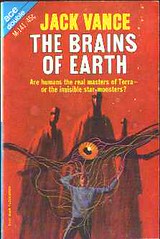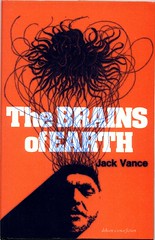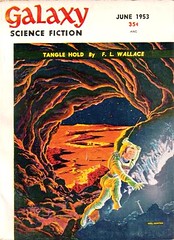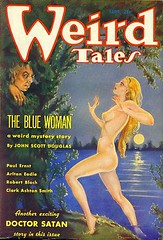"The Body Snatchers" and other Alien Pods
|
Snatchers, impostors and imitators from BEYOND! Pods, or no pods, these creatures will gladly invade your privacy to the point of sharing your brain and eating your grandma for breakfast. Read (watch the movies, too) and shudder at the pulp adventures highlighted below, full of sleek writing and even sleeker alien psychology. ----------------------------------------------   Jack Finney "The Body Snatchers" (nv) © Colliers, Dec 10, 1954 New York: Dell; Eyre & Spottiswode 1955 --/ third place apocalyptic sf novel --/ adventure award --/ style award --/ emotion award: paranoia I am not writing this review. Sure, I might look like, sound like, act like, your regular reviewer but I am, in fact, a flawless reproduction ..... There's a very special kind of story out there and, ironically, it is unique and rare: "The Strange Case of Dr Jekyll and Mr Hyde" by Robert Louis Stevenson is one, "The Murders in the Rue Morgue" by Edgar Allan Poe is another -- and then there's Jack Finney's "The Body Snatchers". What makes these stories special? They are the beginning, a unique and fresh approach: Stevenson created the archetypal story of man's dual nature, Poe created the first detective story, and Finney created ... well, he created pod people. It's hard in some ways to read Finney's book today. Not that it's not a good or even great book, because it's that and much more. Finney's restrained style is there, his wry sense of humor is there, his enviously lean prose is there, but if you'd never read "The Body Snatchers" and picked up a copy only today, you'd fail to see its incredible uniqueness against the now-ubiquitous theme. That's a shame because the world owes a lot to Finney's (deceptively) simple little book. For the first time, we saw the horror of a world grown cool and impersonal, distant and nightmarishly "the same." So powerful is Finney's creation -- as well as the great 1956 film version directed by Don Siegel, starring Kevin McCarthy -- that even the tiniest glimpse of someone acting cold and remote, removed and distant, conjures up the entire idea of the book ... and, naturally, alien seed pods.  Alas, what a lot of people don't know about the book, as it was excised from every adaption of it, is that the aliens in the novel DO have emotions -- it's just that theirs are faked. That twist adds a whole new level of power to the novel: the impostors aren't just unemotional, they actually put a "face" on over their inhumanity -- which is a much more biting commentary than just the simple idea of a cold and drone-like inhumanity. Another horror of the book that's never been adapted is the idea that the pod-people can't reproduce. Once all of humanity has been replaced -- and the aliens have left for space again -- the earth will be left as nothing but a depopulated wasteland. Again, the book really has to be savored, relished -- re-read again and again to appreciate Finney's sly genius. Just look at the characters. It would be easy to make Dr. Miles Bennell and Becky stand out, and so make the impostors more of a statement about conformity. Instead, they are anything but outrageous, which only adds to the chilling creeps when you realize that they, too, have been less than honest with their emotions, that they are too close -- far too close -- to the impostors in their emotional range, the depth of their feelings. Their fight almost feels like it's a battle against the end of the world, sure, but also to preserve the tiny, almost invisible contrast between the cold indifference of the invaders and the slightly-less-cold indifference of the real humans. In the end, "The Body Snatchers" is a truly great book. The trick, though, is to read it for its uniqueness -- and not let all its subsequent impostors and imitators take away from its unique and special shine. (review by author M. Christian)   ----------------------------------------------   Robert A. Heinlein "The Puppet Masters" © 1951, Galaxy, Sep-Nov novel: Doubleday, 1951 --/ fourth place sf novel --/ wonder award --/ adventure award --/ style award There are a lot of ways to look at Heinlein's classic, The Puppet Masters: as a perfect example of what makes a 'Heinlein' book (a determined uberman, a fiery female, sparkling language, etc), an ideal cold-war parable (US vs relentless, soul-sucking invaders out to turn us into mindless slaves), or as an examination of classic paranoia (who can you trust?), but for this review let's take a look at The Puppet Masters as a book about hunting dragons. No, there are no dragons in The Puppet Masters. Set in a near future US after a limited nuclear war, the book is about a covert alien invasion -- a rarity for Heinlein -- by 'slugs:' parasitic lifeforms that control their human hosts. In this way it's a perfect companion to Jack Finney's Body Snatchers: an unearthly threat not just to our world but to our sense of identity. With Finney the aliens impersonated the people around us; with The Puppet Masters the aliens control everyone around us -- two sides of a similar coin. But while Finney approached the theme with sly terror and sneaky suspense, Heinlein puts us in the shoes of 'Sam' an opperative for a so-secret-no-one-knows-about-it-but-the-presdient organization simply called 'The Section' -- run with an iron fist by 'The Old Man' -- that discovers and then fights against the invading parasites. This is what makes the book so interesting. Sure it has Heinlein's fun use of language, a tough-but-not-robotic hero, a flamboyant female character, and his always-interesting social commentary (some so subtle as to escape everyone but a very determined reader); absolutely it works as a Cold War analogy with its war between unique identity and faceless uniformity; and, certainly, it works as a paranoiac mind-game where you literally cannot trust anyone; but then there is the dragon. What I mean is 'dragon' in the Nietzsche sense: "The man who fights too long against dragons becomes a dragon." Sure "Sam" is our hero but he is also a victim of his own organization's ruthlessness: he cannot remember his original face, for instance, for his so many disguises and alterations. The "Section" reads less like a 'boy's own hero' bunch of freedom fighters than it does a Kafka nightmare bureu of manipulation of everyone and everything. Sure the 'slugs' are nasty, evil, horrible creatures, but reading through the book a niggling suspicion rises that the forces that are working against them are ... well, if not as bad then are just a different flavor. This devilish gray area of what makes the book so enjoyable -- in a dark and disturbing way. Reading The Puppet Masters you come away with the unsettling feeling that Heinlein's mind-controlling 'Masters' may mean creatures from outer space, our own ruthlessly cold determination to stop them or ... well, both. Review by author M. Christian ----------------------------------------------  Clifford Simak "No Life Of Their Own" © Galaxy, Aug 1959 All the Traps Of Earth, 1962 --/ third place time sf novella --/ wonder award --/ style award --/ humour award --/ idea: luck/time dimension plus alien/human village melting pot --/ rare find Entirely different (not urban, but rather relaxed country) view of alien infiltration: I could write the whole article about this one... First, this is one the best examples of Simak's "pastoral", small-town-style writing, where we are comforted just by simple rural surroundings and simplicity of how people speak and live. All the more strange, then, the out-worldly elements seem when they appear, and all the more the "sense-of-wonder" is activated, contrasted against subdued background. This might be Simak's writing secret, successful formula that I can not get enough of... Second, the sheer intensity and weirdness of alien elements are breathtaking, accompanied by rapid play of ideas. And third, but not last, - humour. The story is about the "melting-pot" of aliens and humans in a normal village, where aliens do whatever they please and humans just observe, slack-jawed. Humans are confronted with "alternate-universe-inhabiting" creatures who play the hand of good luck to some chosen people, both humans and aliens are trying to solve time mysteries, and in the end "good time was had by all" (Review by Avi Abrams) Read full review of "All the Traps of Earth" collection ----------------------------------------------   Jack Vance "Brains Of Earth" (nv) (also as "Nopalgarth") (Nopalgarth series) © Ace Double, 1966 also - DAW Books, 1980 --/ fourth place sf novel --/ wonder award --/ idea: para-cosmos --/ shock value This is a small pop-art masterpiece with some psychedelic overtones. It feeds on paranoid ideas of the Fifties (aliens possessing our brains), embellishes it with cool descriptions of psychological and aural warfare (reminds me of "Final Fantasy" ghostly doppelganger entities), and reads like a gaudy poster in its simplicity of idea and plot. I often skipped many pages, to arrive sooner at the bizarre parasitic "brain" warfare sequences, which make this book stand out from other invasion fare, and from everything else Vance has written. Review by Avi Abrams ----------------------------------------------  Clifford Simak "Good-night, Mr. James" (also as "Night of the Puudly") (also as "The Duplicate Man") © Galaxy, Mar 1951 All The Traps Of Earth, 1962 Skirmish, 1977 --/ fourth place sf novella --/ wonder award --/ idea award --/ style award Another very complicated human / alien relationship unfolds in a classic tale, written at the beginning of 1950s "snatchers" craze. It is generally a horror story, about a duplicate human being created to destroy a particularly nasty alien illegally smuggled to Earth. Quite edgy and thriller-like writing. This is certainly a hit, blockbuster, Hollywood-friendly creation with lots of color and typical Simak world-building. Read full review of "All the Traps of Earth" collection ----------------------------------------------  James Schmitz "We Don't Want Any Trouble" © Galaxy, Jun 1953 Eternal Frontier, 2002 --/ fourth place sf story --/ wonder award --/ shock value Another interesting treatment of the alien infiltration, and how to deal with it - quite a ruthless story, suspenseful and strong. Aliens among us and they can do mimicry very well (probably even better than in "Body Snatchers") and they put up quite a spectacle for their human captors.... right before the execution. Idea is not fresh, but the gutsy, hard-boiled treatment of it in this story makes it one of the best for Schmitz. ----------------------------------------------  Robert Bloch "The Shambler from the Stars" (Cthulhu Mythos) © Weird Tales, Sep 1935 The Opener of the Way, 1945 --/ fourth place f story --/ wonder award --/ style award The Thirties gave history many monsters, some very real (like Stalin, Hitler, etc), but most imaginary - in the pulps. No other decade produced such a fertile crop of aliens and mad-scientist pets, and most of them were indeed pretty ugly. Witness this "star vampire" creature (part of the Cthulhu Mythos zoo of beings)... Quote from the story: "It was red and dripping; an immensity of pulsing, moving jelly; a scarlet blob with myriad tentacular trunks that waved and waved. There were suckers on the tips of the appendages, and these were opening and closing with a ghoulish lust.... The thing was bloated and obscene; a headless, faceless, eyeless bulk with the ravenous maw and titanic talons of a star-born monster". "The star vampire dwells in outer space and is characterized by its ravenous appetite for blood. The creature uses its enormous talons to capture its prey, grappling and crushing the unfortunate and then draining the victim's blood through its tubular suckers. It is normally invisible, but following a sanguine repast, the star vampire becomes temporarily visible from the undigested blood it has absorbed." The story itself is an assault on the senses in the best "weird wonder" pulp tradition. Bloch apparently had a blast writing it, even killing off his fellow writer H. P. Lovecraft at the end of the story, in his unbridled enthusiasm. Lovecraft returned the favour, killing off a Bloch character in his "Haunter of the Dark". All in good fun, fellows. Review by Avi Abrams ---------------------------------------------- Labels: Features |
Click to go to "Dark Roasted Blend" site

|
Collecting Pulp Magazines Ephemera Interview with Avi Abrams |

|
Enchanting Victorian Fairy Tale Art "Then world behind and home ahead..." |

|
Exceptional British Scifi Artwork from the 1950s Space Pulp Art by Ron Turner and other British artists |

|
Pulp Pleasures: Eando Binder Great space adventure fiction from the 1930s "Where Eternity Ends" and other rare gems |
Also read recent posts:
Author's Pen Names - Most Complete List Ever
The Wonder Timeline: SF&F Restrospective
Space Adventure Article
|
"SF&F Reading Experience" is part of "Dark Roasted Blend / Thrilling Wonder" family of sites. We try to highlight the most entertaining and rewarding science fiction and fantasy, with emphasis on memorable reader experience, not necessarily general acceptance by the critics. Have fun, and delve into our extensive ratings and reviews! Most reviews are written by Avi Abrams, unless otherwise noted. Reviews also appear on our unique historical retrospective page Wonder Timeline of Science Fiction. Feel free to submit your own review, if a particular story is not listed here. All major OFFICIAL AWARDS are highlighted in BLUE ("winner" has a letter "W" by it, otherwise it is a runner-up only) Our PERSONAL AWARDS (ratings) are highlighted in RED and PURPLE: --/ first place : --/ second place : --/ third place : --/ fourth place : --/ cool : (equal to fifth place) ALL "BEST OF" LISTS ARE LOCATED HERE These awards are given in the following categories: - novel : - series : - novella : - story : - collection : Also, there are our personal STYLE / GENRE SPECIFIC AWARDS. These reflect the story's content and the lasting impression on the reader: --/ wonder award sense-of-wonder, "visual intensity" and inventiveness --/ idea award originality of idea / concept --/ adventure award exhilarating plot, excitement / action --/ style award outstanding literary qualities, inimitable style --/ romance award intense and beautiful love / relationships --/ humour award funny and cool --/ emotion award touching, lasting impression, sensitivity --/ shock value altogether wild --/ awesome scale mind-boggling; further enhances sense-of-wonder --/ rare find very hard to locate, mostly from old pulps, never reprinted, etc. Again, please feel free to leave your own review or comment under every writer's entry; also recommend us other stories you liked. |

6 Comments:
Really DRB? Writing about pod people without Mentioning Heinlein's _The Puppet Masters_? Shame on you. Yes, they are not quite replaced as much as taken over, but the end result is identical storywise.
Michael, amazingly enough, I did not read Heinlein's book yet, although, it definitely should be on the list - we'll ask somebody on our team to write a review. Thanks!
Simak is the Grand Master. Even his weak stuff is better than most strong stuff written today.
Dana Wynter....mmmmm... I would gladly assimilate. She was the only woman who made joining the Royal Navy seem like a good idea(Sink the Bismarck!).
For completeness sake: Eric Frank Russel's novel "Sinister Barrier" deserves a mention in this list.
I just wanted to mention that John Christopher's The Possessors (1964) should be on this list. Fredric Brown's The Mind Thing is a little different, but still related to the subject.
Post a Comment
<< Home